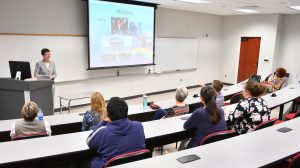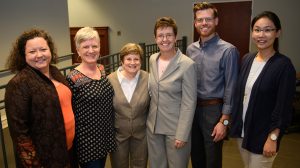
Elaine Maccio, associate professor of social work at Louisiana State University, presents ‘Culturally Competent Social Work Practice with LGBTQ Persons’ to faculty and students in the UM Department of Social Work. Photo by Robert Jordan/Ole Miss Communications
OXFORD, Miss. – Social workers have a duty to help clients from diverse backgrounds, and the best practitioners understand their clients’ cultural histories and social context, a scholar on the issues affecting lesbian, gay, bisexual and transgender people told students and faculty this week at the University of Mississippi.
Elaine Maccio, associate professor of social work at Louisiana State University, visited UM for a couple of presentations as a kickoff to the university’s LGBTQ History Month programming. Her visit was co-sponsored by the Department of Social Work and the Sarah Isom Center for Women and Gender Studies.
“When you understand their history, it helps really personalize an entire group of people,” Maccio said. “If you don’t talk about history or things that make the culture unique, it is easy to just dismiss them and trivialize them. The more you personalize it and humanize it, the harder it is to just dismiss LGBTQ people.
“As social workers, in particular, that can’t happen, especially steeped in social justice the way (the practice) is, helping those who are traditionally underserved. This is just part of the normal curriculum that would be associated with any of the populations that we work with, and history is a part of that.”
Social workers must educate themselves on any population with which they’re working, Maccio explained. For many clinicians, it helps to immerse themselves in unfamiliar cultures.
“Attending presentations like this is certainly a part of that,” she said. “Getting to know LGBTQ people, frequenting places the LGBTQ people might be, attending events – anything that sensitizes them to what life and reality is like for LGBTQ people – helps develop their sensitivities and their competence around this population.”
Statistically, social workers will be presented with issues that affect their LGBTQ clients more frequently than their heterosexual peers. Though individuals identifying as LGBTQ account for only 3.8 percent of the U.S. population, they are the victims in 21 percent of reported hate crimes.
A report by the Centers for Disease Control and Prevention found that 46.4 percent of lesbian women, 74.9 percent of bisexual women, 40.2 percent of gay men and 47.4 percent of bisexual men report being victims of sexual violence.
Some 2 million children in the United States are being raised by lesbian, gay, bisexual or transgender parents who have limited access to a range of health services, insurance and tax breaks available to heterosexual couples. Social workers are responsible for helping many of those families traverse these added stressors through counseling and outreach, she said.

Daphne Cain (left), chair of the UM social work department, and social work faculty members Amy Fisher (second from left), Drew Leffman (second from right) and Na Youn Lee (right) welcome LGBTQ studies expert Elaine Maccio, (third from right) and her wife, Sherry Desselle. Photo by Robert Jordan/Ole Miss Communications
Maccio provided appropriate terminology and best practices for managing the care of LGBTQ clients and their families, explaining how to build rapport, exercise empowerment practice and self-assess to identify personal feelings and biases about sexuality. She also discussed resources such as PFLAG and other support groups and how to incorporate them into treatment plans.
“It is critical that we as social workers make every effort to learn as much as we can about the people we serve, especially underrepresented and vulnerable populations,” said Daphne Cain, social work department chair. “We are so lucky to have had Dr. Maccio on campus to help us develop deeper cultural competence for our practice.”
In another presentation, Maccio detailed the development of LGBTQ culture from ancient to modern times, highlighting critical moments in history, such as the emergence of the first gay rights organization, the Mattachine Society, and the 1960s Stonewall riots, which was the first time the gay community of Greenwich Village fought back against police harassment. She also discussed the evolution of laws that affect sexual freedom, marriage equality and children of LGBTQ families.
“I came away from the talk with an extremely informative timeline of key moments in the formation of queer identity, beginning as far back as 800 BCE,” said Laura Wilson, a third-year doctoral student in English. “What seemed most interesting in the presentation was the ‘two steps forward, one step back’ sense of progress that Dr. Maccio discussed as she elaborated on legal motions that enabled more equality for the LGBTQ community, followed almost immediately by bills that seek to remove these human rights.”
A native of the U.K., Wilson said she was fascinated by the discussion of how American perspectives are grounded in legal changes at the state and federal levels.
“That a history of queer identity would be so punctuated by juridical changes like this, clearly demonstrates to me that LGBTQ equality is a vitally important issue of social justice,” she said.
For more information about the Department of Social Work, email socialwork@olemiss.edu. For information about the Sarah Isom Center for Women and Gender Studies and a schedule of LGBTQ History Month events, visit https://sarahisomcenter.org/.